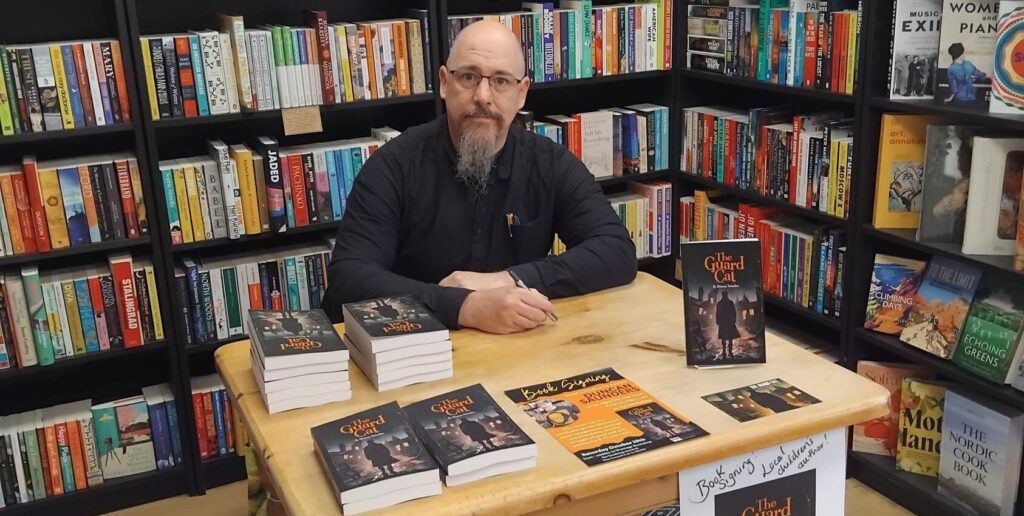
“The pace of time frightens me”: novelist Phil M. Shirley on heavy rock bands, the heroin- esque music of Bill Evans, the troubled history behind his first novel, The Rivers That Run Through Us, his new poetry collection, The Happening of Magic, and his forthcoming novel Darlene. Interview Elan Kabisch The author’s current novel is inspired by his love of the River Thames, particularly the stretch of water that runs through East London. He talks about his journey from sportswriter to novelist – and why he misses his home on the Isle of Dogs. “I keep coming back here, well, periodically anyway. I hate the place because it reminds me of when I was last settled.” We’re at the Coach & Horses pub in Greenwich market, in the company of a colourful cluster of market stalls and a cacophony of tastes and smells. English novelist Phil M. Shirley, visiting his former “thinking ground” for a reading from his latest book, the poetry collection The Happening of Magic – his first foray into the “difficult art”, and his tenth published work. It’s an irresistible read, running the gauntlet from limericks and ballads to free verse and odes and from confessional writing to urban myths and legends. It’s also a deeply personal and thought provoking work largely set in and around the Isle of Dogs, as is his first novel The Rivers That Run Through Us, and full of the author’s trademark darkly comic, and unorthodox style– so the chaotic market hall, a stone’s throw from the River Thames, makes a fittingly immersive interview location. We dart between reviews for The Rivers That Run Through Us, which have been immensely flattering, and the looming “six-zero.” “I sometimes forget just how much writing I’ve done, in terms of actual published books,” he says, “perhaps because most of them are forgettable.” This is far from false modesty, rather the honest observation of a writer driven by a “deep, unrelenting ache” to get better at “the craft.” “I’m not prolific, not in the slightest,” he says. “I envy those writers blessed with high speed and high output. I’ve got half a dozen works-in-progress, all novels, but I’m slow, and the pace of time frightens me. It’s the big six-zero at the end of this year. It’s become much, much less of a big deal than it used to be. I don’t really care anymore. In fact, in many respects, I’m happier with myself than I’ve ever been. One good thing about getting older is the option to divorce the ego. I don’t miss mine, and without it, life is an easier road to travel, although the passage of time is a relentless bastard. The last thing I remember, I was writing The Soul of Boxing in 1998 and thinking a six-month deadline was a lifetime. The next minute, someone is asking me to consider publishing an updated 25th anniversary edition.” There was a long break between his last work for HarperCollins, The Soul of Boxing, in the autumn of 1999, and his next published work, The Rivers That Run Through Us, his debut novel in 2023. It was lockdown that returned Shirley’s imagination and passion to creative writing. “I consider The Soul of Boxing as one of my better works. It was longlisted for the William Hill Sports Book of the Year. That and Blood & Thunder, which I more or less wrote at the same time, were good to me, in terms of sales and reviews,” he reflects. “But I was burned out. Eight books in three years, plus a huge amount of writing for magazines and newspapers. I went ‘corporate’ for a while, a cog in a propaganda machine.” In 2019, Shirley was offered a job ghost-writing for an oil company and ended up in East London, by the River Thames, with a view of the office, in Canary Wharf, as a daily reminder of “selling out.” And then the oil company went into lockdown after an employee experiencing flu-like symptoms was tested for coronavirus. This was February 2020. “I was grateful for the pandemic,” he says. “I fell in love with the isolation and the river. And I thought: now I can write again. A lot of other stuff, life situations, had happened. Writing The Rivers That Run Through Us was a cathartic release. Greenwich was my thinking ground and a ghost town, although you could still get a pint outside .” The Trafalgar Tavern, a Victorian riverside pub where the Thames laps up at the windows, came up with an order-by-text outdoor bar system. “A handful of rebels drinking on the cobbles, watching the river, cold and lonely and devoid of any human activity. Only the Gulls and Cormorants will witness the ritual.” The Rivers That Run Through Us, a wonderfully bizarre and haunting narrative about five tormented brothers who are grappling with love, loss, and existential dread, was initially signed by a well-known New York publisher but the project ran into trouble, some of it Shirley’s own fault and the rest, well that’s another story for another day. “I’m gagged now and was gagged then. But it worked out well, in the end.” Shirley was asked to rewrite parts of the novel to make it “less culturally abrasive.” He refused and, after a lengthy tug-of-war with New York lawyers, wrestled back the rights and found a new home for the work. “Some may call it censorship,” he says. “It is what it is.” Now 59, Shirley has spent enough time plying his trade for an indifference to politics to seep beneath his skin. A stint “working for Hollywood” confronted him with the “darker forces” of the craft, as both an author and screenwriter. “It was extraordinary,” he recalls. “Very exciting, but utterly frustrating.” His time as a contracted author for HarperCollins was “the best thing in the world,” he tells me. “It launched my career,” he says. “I was raw, and the experience fashioned me into a half-decent writer.” He longed to be a music journalist. “My dream, as a young writer, was to work for one of

Q&A: Duncan Saunders on his popular Young Adult “horror” novel ‘The Guard Cat.’ Q: It’s been almost a year since the release of The Guard Cat. How has post publication life treated you? It’s been busy. I’ve been involved in several events, signing copies of The Guard Cat, alongside my day job of teaching. Christmas has been my first break since the summer, when the publicity drive for The Guard Cat started in earnest. It’s been busy but enjoyable. Q: How would you describe The Guard Cat? What can readers expect from this story? I describe it as a supernatural adventure novel, set at Christmas in a small English village in the 1980s. It is a story full of mystery, and without giving away spoilers, cat lovers should find plenty to enjoy in the book. It’s ideal for children and young adults (and older adults) who enjoy an eerie, wintery tale. It’s the sort of book that is best read while curled up under a blanket in a comfy chair while the wind howls outside in the darkness of a winter night. Q: Writers have plenty of ideas and fragments of ideas, but not everything, “makes the cut.” What was it about The Guard Cat that persuaded you to put the blood, sweat and tears into its creation? When I was a child, we were snowed into the village where we lived a week before Christmas, during a power cut; I remember making toast over an open fire using a toasting fork and reading by candlelight. It was an experience which stuck with me and later on, led me to think “what if it wasn’t just a storm?” The story then took on a life of its own. I hope I’ve done justice to the dark and creepy atmosphere of that midwinter in the countryside. Q: Did you read much horror or weird fiction as a kid? Who were your favourite authors when you were 13 or 14? I was a voracious reader as a youngster. At 14, I’d graduated from Roald Dahl onto fantasy fiction; I’d discovered Tolkien by that time and had read a few Terry Pratchett books. I think I was reading the Dragonlance trilogy. A year or two later I discovered darker stories by authors such as Stephen King, so my love of the supernatural came a little later and it wasn’t until my twenties that I started reading more of the classic horror writers, such as Lovecraft. Q: Is it true you used to be a professional wrestler? It is; I think some of the matches can still be found online if you know where to look! I wrestled for a few years, mostly in the South West of England. I was a filthy villain called The Gallowman, who would cheat to win and used a hangman’s rope in his matches as often as he could get away with it. The storytelling and character aspect of wrestling always appealed to me; my wrestling days may be in the past, but The Gallowman as a character may one day make a reappearance. Q: Do you have a particular daily routine for your writing? What are some of the enjoyable, hardest, and strangest parts about writing for you? Being a teacher as my “day hustle” can make it a struggle when it comes to writing; my usual time is the last few hours of the day, before bed. This can be a problem if I get on a roll, as I’ll keep going and suddenly realise that it’s 3am! I absolutely love bringing characters and stories to life and hearing that someone has enjoyed something I’ve written is a huge compliment and the best feeling that there is. Q: What or whom have been the biggest influences on your writing? As mentioned previously, I love fantasy fiction; Tolkien, Terry Pratchett and later authors such as Tad Williams have all influenced my love of reading if not my writing style. The Guard Cat was influenced by classic horror such as Dracula and the works of HP Lovecraft, although it feels arrogant to mention myself in the same breath as such greats. As for my writing, I’d describe my ideas process as looking out of the window, asking “What if?” and then developing the ideas. Q: What advice would you give to other aspiring writers? Firstly, keep writing; like any skill, the more you practise, the better you get. The other thing that has helped me is to listen to all the advice you can get from people who have been there before, and then choose the parts that suit you. Everyone’s voice is unique, so use what you can to help you find yours. Q: What’s next for you? Do you intend to continue writing YA fiction? Absolutely; I’ve heard it said that a writer isn’t someone who chooses to write, it’s someone who can’t stop themselves writing. More specifically, a follow up for The Guard Cat is on its way. Watch this space for more details! BUY THE BOOK A wonderful gothic adventure about imagination, courage and friendship and the struggle of good and evil. In a small English village, cut off from the outside world during a snowstorm and blackout a few days before Christmas, something wicked is threatening life as they know it.. A trio of unlikely heroes ~ members of an elite organisation known as The Order of the Silver Shield ~ come to the rescue of the endangered inhabitants. Standing in their way is a dreadful life draining entity called The Unbeing and the cunning Dr Von Hawkfire. Will The Order of the Silver Shield be a match for the diabolic duo, or will darkness prevail? Genre: Fantasy/Young Adult fictionFormat: 232 pages, PaperbackISBN: 9781739394974 Add to Cart ABOUT THE AUTHOR DUNCAN SAUNDERS is a teacher and former professional wrestler whose first novel, Dinosaurs, Aliens and The Shop That Sells Everything (Ghostly Publishing) featured on the Amazon best sellers list for Children’s Sci-Fi. He lives in the shadow of the Uffington White Horse in Oxfordshire. His literary influences include Roald Dahl,

A Q&A with crime novelist Samantha Turner who discusses her book The Burning Truth, a gripping drama surrounding the discovery of a body in a locked, burning canal boat – the latest instalment in the Lizzie Holland crime series. What first inspired you to write The Burning Truth? The Burning Truth carries on the back story started in my first two novels, The Devil You Know & The Depths Of Murder which follow the protagonist, Lizzie Holland and the tragedies that befall her. The inspiration for the novel came from wanting to provide answers to the ongoing mystery as well as highlighting the struggle between Lizzie’s crucial role as a DI and her turbulent personal life. I have a close relationship with the canal as I can see the towpath and water from my patio. Seeing the array of colourful (in appearance and name) of the various barges sailing by and the houseboats that are permanently moored here, the story for The Burning Truth began to form in my imagination. Combined with the location of my local pub and other areas I have visited plus, a sprinkling of artistic licence the novel was brought to life. Themes of gender and violence pervade the novel. What inspired this decision? I find this question a little difficult to answer as I didn’t begin with this intention; I never do! The story develops a life of its own as I hit the keys. However, I am a writer of crime thrillers so my readers do expect some level of violence. As for gender, again I didn’t give it much thought. Violent crime can happen to anyone, and yes, we seem to hear more on the news about violence against women, but I feel we shouldn’t discount the risk to men. Whatever our gender, high-risk lifestyles, deciding to take that shortcut down the dark alleyway, or just being in the wrong place at the wrong time all have the chance of ending in tragedy. How would you introduce Lizzie Holland to your readers? The Lizzie Holland we see now is quite changed to the despondent, negative woman from book one. Lizzie is a fiercely strong and independent Detective Inspector, at almost fifty years old she has only been part of The Lancashire Constabulary for ten years. Solving violent murders, rapes and other vicious incidents in the Major Crime Unit is her new purpose for living. Sometimes her need for justice can give way to vengeance if she allows her temper and past experiences to overcome her judgement. In her spare time, the once unfit and overweight Lizzie likes to run, practice self-defence and drink lots of strong coffee. She is also an avid animal lover and vegan. What research did you do in the writing process? I am fortunate to have an acquaintance who owns a canal barge and one who lived on a boat for many years. My other friend is an ex-police officer. I am afraid to say I bombarded them all with questions and I had the opportunity to view the barge in person which gave me a good insight into the layout etc. I also spoke with my local fire brigade and used my past career as a pharmacy technician for accuracy. While some of the locations in the book are based on real places which I visited I have invented certain names, pubs, and landmarks for the good of the story. What do you hope readers will take away from this novel? Firstly, I hope readers will thoroughly enjoy the novel. I also wish for readers to invest in Lizzie Holland, to care about what happens to her and to walk by her side. If the novel stirs emotions, creates suspense and instils fear then I have done my job. However, I have added a touch of humour for light relief. The novel hits on controversial topics, I hope readers aren’t offended by this and understand that as authors we have to portray all opinions, even if they seem cruel or out of date. The Burning Truth by Samantha Turner is published by Foreshore in the spring in paperback. SAMANTHA TURNER is an English crime writer, novelist and poet. She is the creator of the Lizzie Holland series and author of The Devil You Know and The Depths of Murder – the first two Lizzie Holland crime novels.



